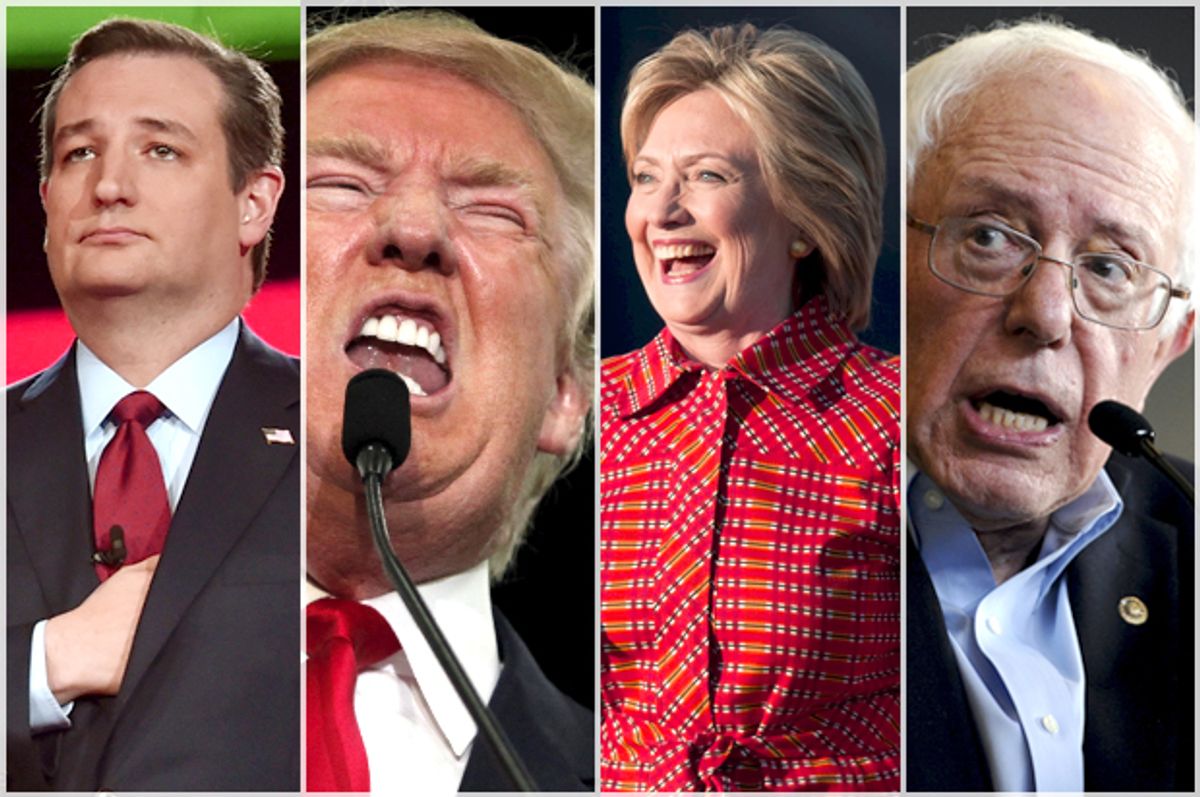You thought the last couple of months were wild on the election front? Well it's now 2016 and we're roughly a month away from the first caucuses, so things will be getting more intense by the day.
The presidential race has been both surprising and predictable so far, with outsiders dominating the GOP field and an insurgent candidate like Bernie Sanders challenging the Democratic establishment. The dynamics of the race haven't changed very much in the last month or so, but here's what you may have missed while tuned out for the holidays.
On the Republican side, two more candidates have “suspended” their campaigns: Lindsey Graham and George Pataki (yes, Pataki was running for president). Graham and Pataki were bottom-feeders from the time they entered the race, with neither cracking 1 percent in the polls. Their departures mean almost nothing in terms of the overall race, but it does thin out a crowded field.
Third-tier candidates like Rick Santorum and Mike Huckabee are still hanging around, but not for long. Santorum is as irrelevant as Graham and Pataki were, and Huckabee is marginally better, averaging 1.8 percent in the latest Real Clear Politics poll. Santorum and Huckabee, along with Fiorina, Kasich and Paul, are likely the next candidates to drop out. Carly Fiorina's 15 minutes are clearly up. Paul, despite his reasonableness, hasn't energized the libertarian wing of the party. And Kasich's moderate approach simply hasn't resonated with the base.
As we near the Iowa caucuses, it's clear that the Republican race comes down to three candidates: Donald Trump, Ted Cruz and Marco Rubio. Bush and Chris Christie are competing with Rubio to be the establishmentarian candidate, but Rubio appears to have all the momentum. The junior senator from Florida is polling at 11.6 percent in the national polls, behind Trump and Cruz. Bush and Christie are virtually tied, hovering around 5 percent. Christie is dumping all his eggs in the New Hampshire basket, but that's his only hope and it's not enough. Bush has continued attacking Trump, as that's his only play, but the damage is done. Bush is too milquetoast for this political climate, and his window closed long ago.
By all accounts, this is still Trump's race to lose. He's polling at 35 percent, while Cruz, currently in second, remains at 18 percent. Pundits like yours truly have patiently waited for Trump to implode, but it's not happening and it's no longer reasonable to expect otherwise. He has done everything possible to subvert his own campaign, and Republican voters have rewarded him for it.
Ted Cruz is a formidable challenger, however. To the chagrin of GOP insiders, Cruz remains the most likely nominee behind Donald Trump. He's leading the real estate mogul by 3 points in Iowa and he's gaining momentum in other early primary states as well. More important, Cruz is well-funded and best positioned to dethrone Trump as the default anti-establishment candidate. How this dynamic plays out will be one of the more interesting storylines in the Republican race.
On the Democratic side, things are shaping up more or less as expected. Clinton is still the clear front-runner, as she leads Sanders 54-37 in the latest national polls. Clinton also has a sizable lead in three of the first four primary states — Iowa, South Carolina and Nevada. After the most recent Democratic debate, moreover, Clinton appears to have widened the gap. A CNN/ORC poll conducted in the days after the debate confirms that Clinton was viewed favorably by most Democratic viewers. The faux-controversy over the DNC data breach may have hurt Sanders, but likely more problematic is the conversational shift away from economic issues and towards national security concerns, which plays into Clinton's hands (although it really shouldn't).
In any case, Clinton remains the favorite to win the nomination. More than anything else, she's benefited from the overwhelming support of the Democratic Party establishment. The deck was stacked against Sanders from the very beginning, and the fact that he's seriously challenging Clinton is itself impressive. Sanders is by no means out of it, though. In the next month or so, it will be critical for him to stay on message. Insofar as this race is about the economy and inequality, Sanders will do well.
Clinton will surely win Iowa, but the second primary state is New Hampshire, where Sanders leads Clinton 49-43. If Sanders wins in New Hampshire, the narrative could quickly shift in his favor. And that's the best way for Sanders to keep his momentum going, particularly after the news that he shattered the fundraising record for most individual contributions at this point in a presidential campaign.

Shares